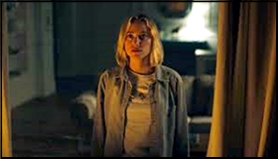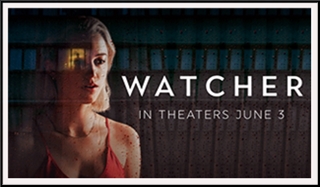Mon 6 Jun 2022
A Movie Review by Jonathan Lewis: WATCHER (2022).
Posted by Steve under Reviews , Suspense & espionage filmsNo Comments

WATCHER. IFCMidnight, 2022. Maika Monroe as Julia, Karl Glusman as Francis, Burn Gorman as Daniel Weber, Madalina Anea as Irina. Director: Chloe Okuno.
I’m glad I didn’t read anything about Watcher before I went to see it recently at an independent movie theater in North Hollywood. That is to say: I knew nothing beyond the basic premise: a woman has a watcher/stalker problem. It’s a plot as old as time, especially when it’s a young woman who moves into a new apartment. This is territory that has been fodder for countless thrillers and slashers, some memorable. Many decidedly not.
Does Watcher have anything it in that sets it apart from the dozens of similar movies that have come before it? Before I can answer this question, I must point out that the film doesn’t necessarily break new ground and that it wears its myriad influences on its sleeve. There’s Hitchcock, of course. Particularly Rear Window (1954).
There’s also Roman Polanski. I’ve seen one reviewer make references to both Repulsion (1965) and Rosemary’s Baby (1967), but the film that came immediately to my mind was Polanski’s later thriller, Frantic (1988) in which Harrison Ford portrayed a doctor out of his element in Paris, searching for his missing wife. One salient aspect from that exceptionally well-crafted film that continues to stick in my mind is how Ford’s character finds the language barrier – he doesn’t speak French – to be a deeply threatening psychological barrier to his quest.

That’s even more the case in Watcher, in which a youthful married couple moves from New York City to Bucharest, Romania. Julia (Maika Monroe) and Francis (Karl Glusman) seem to be very much in love and eager for a new chapter in their lives. Francis, who speaks Romanian, has been promoted to a marketing agency’s Romanian office. Julia, who we know was an “actress,†doesn’t speak a word. She is basically left alone to fend for herself in the couple’s apartment while Francis is off at work, making money and interacting with colleagues.
What begins innocuously enough (or does it?) ends up as a waking nightmare. Julia, soon after moving into the decently outfitted apartment, sees what she thinks is a man staring at her from the building across the street. It doesn’t help her growing sense of isolation when she learns that there’s a serial killer – the media calls him “The Spider†– attacking young women in the neighborhood.

Pretty soon, Julia is certain she is being stalked as prey. But no one believes her; at times, she almost doesn’t seem to believe herself. The movie skillfully plays with this ambiguity. What does it mean when someone who thinks they are being stalked begins to stalk their purported stalker? Is Julia being watched or is she the watcher?
There’s very little actual violence in Watcher, but when it comes it comes brutally and most of all, loudly. Most of the time, what envelops the viewer is not blood and gore, but atmosphere. Dread, isolation, and madness are the name of the game here.
The director makes the most of the on-location filming. Bucharest is as much a character in the film as Paris was in Frantic. The streets, museums, and the subway system all feature prominently in the visual narrative. Monroe’s acting is top notch, although it’s the subtly hidden interplay between her and the camera that makes her performance stand out. It’s well worth a look. One might even say it’s worth watching.
